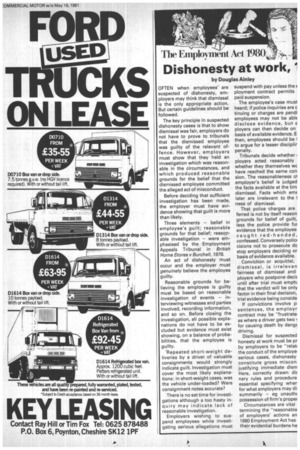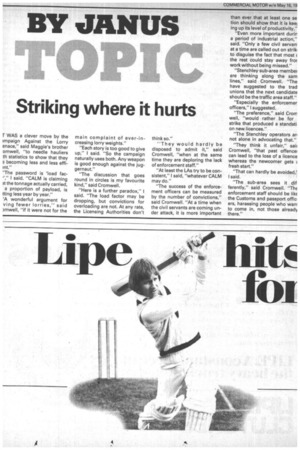The Employment Act . 1980 .
Page 95

Page 96

If you've noticed an error in this article please click here to report it so we can fix it.
Dishonesty at work,
by Douglas Ainley OFTEN when employees are suspected of dishonesty, employers may think that dismissal is the only appropriate action. But certain guidelines should be followed.
The key principle in suspected dishonesty cases is that to show dismissal was fair, employers do not have to prove to tribunals that the dismissed employee was guilty of the relevant offence. However, employers must show that they held an investigation which was reasonable in the circumstances, and which produced reasonable grounds for the belief that the dismissed employee committed the alleged act of misconduct.
Before deciding that sufficient investigation has been made, the employer must have evidence showing that guilt is more than likely.
Three elements — belief in employee's guilt; reasonable grounds for that belief; reasonable investigation — were emphasised by the Employment Appeals Tribunal in British Home Stores v Burchell, 1978.
An act of dishonesty must occur and the employer must genuinely believe the employee guilty.
Reasonable grounds for believing the employee is guilty must be based on reasonable investigation of events — interviewing witnesses and parties involved, recording information, and so on. Before closing the investigation, all possible explanations do not have to be excluded but evidence must exist showing, on a balance of probabilities, that the employee is guilty.
'Repeated short-weight deliveries by a driver of valuable consignments would strongly indicate guilt. Investigation must cover the most likely explanations; in short-weight cases, was the vehicle under-loaded? Were consignment notes accurate?
There is no set time for investigations although a too hasty inquiry may indicate lack of reasonable investigation.
Employers wishing to suspend employees while investigating serious allegations must suspend with pay unless the E ployment contract permits paid suspension.
The employee's case must heard; if police inquiries are c tinuing or charges are pendi employees may not be ablE disclose evidence, but c ployers can then decide on basis of available evidence. E then, employees should be I to argue for a lesser disciplir penalty.
Tribunals decide whether ployers acted reasonably whether they themselves wc have reached the same con sion. The reasonableness ol employer's belief is judged the facts available at the tim dismissal. Facts which emE later are irrelevant to the i ness of dismissal.
That police -charges are ferred is not by itself reason grounds for belief of guilt, less the police provide fur evidence that the employee caught red-handed, confessed. Conversely polio( cisions not to prosecute do stop employers deciding or basis of evidence available.
Conviction or acquittal, dismissal, is irrelevan fairness of dismissal and players who postpone deciE until after trial must emphi that the verdict will be only factor in their final decision, trial evidence being conside
If convictions involve p sentences, the employr contract may be "frustrate, as where a driver gets two for causing death by dangE driving.
Dismissal for suspected honesty at work must be pr by employers to be "relati the conduct of the employe, serious cases, dishonesty constitute gross miscon justifying immediate dism Here, correctly drawn diE nary rules and procedure essential specifying wher for what employers may di! summarily — eg unauth( possession of firm's proper
Circumstances are vital termining the "reasonable of employers' actions an 1980 Employment Act has their evidential burdens he
r WAS a clever move by the impaign Against the Lorry enace," said Maggie's brother omwell, "to needle hauliers th statistics to show that they 3 becoming less and less effi
'The password is 'load fac'," I said. "CALM is claiming )t the tonnage actually carried, a proportion of payload, is tting less year by year."
'A wonderful argument for ving fewer lorries," said Dmwell, "if it were not for the main complaint of ever-increasing lorry weights."
"Each story is too good to give up," I said. "So the campaign naturally uses both. Any weapon is good enough against the juggernaut."
"The discussion that goes round in circles is my favourite kind," said Cromwell.
"Here is a further paradox," I said. "The load factor may be dropping, but convictions for overloading are not. At any rate, the Licensing Authorities don't think so."
"They would hardly be disposed to admit it," said Cromwell, "when at the same time they are deploring the lack of enforcement staff."
"At least the LAs try to be consistent," I said, "whatever CALM may do."
"The success of the enforcement officers can be measured by the number of convictions," said Cromwell. "At a time when the civil servants are coming under attack, it is more important than ever that at least one se tion should show that it is keel ing up its level of productivity."
"Even more important durin a period of industrial action," said. "Only a few civil servan. at a time are called out on striki to disguise the fact that most ( the rest could stay away fror work without being missed."
"Stenchley sub-area member are thinking along the sam lines," said Cromwell. "The have suggested to the trad unions that the next candidate should be the traffic area staff."
"Especially the enforcemer officers," I suggested.
"The preference," said Crow well, "would rather be for strike that produced a standsti on new licences."
"The Stenchley operators an not alone in advocating that."
"They think it unfair," sair Cromwell, "that past offence! can lead to the loss of a licence whereas the newcomer gets fresh start."
"That can hardly be avoided,' I said.
"The sub-area sees it dif ferently," said Cromwell. "ThE enforcement staff should be likE the Customs and passport offic. ers, harassing people who wanl to come in, not those alread}. there."




































































































































